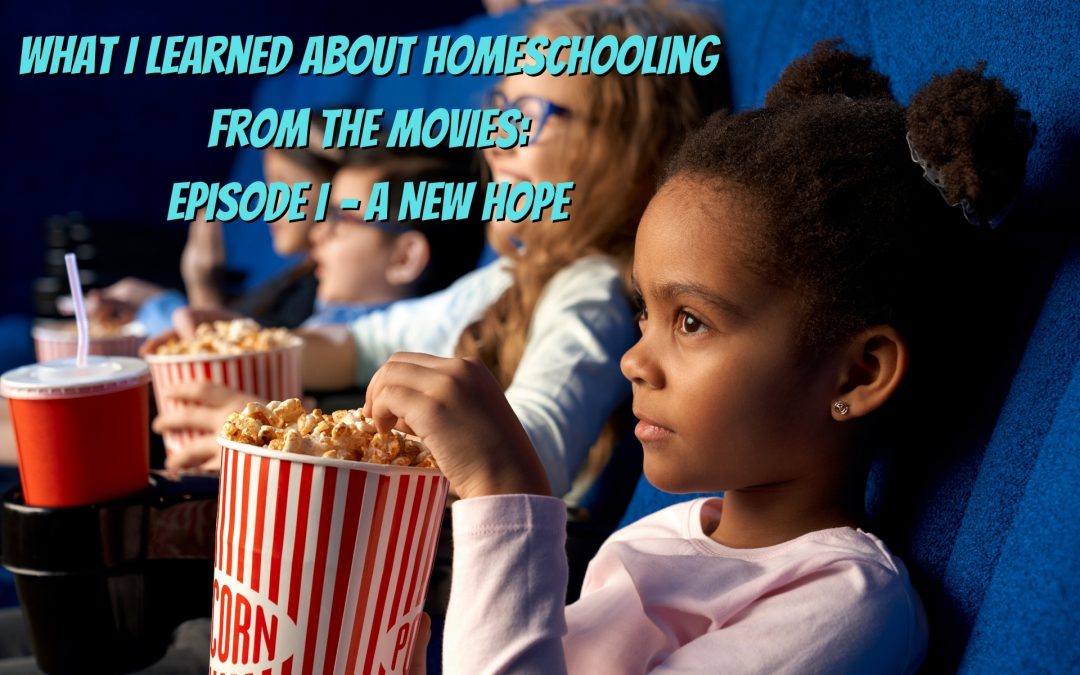Not so long ago in our very own galaxy, many of us decided to take on homeschooling. We dove in headfirst at light speed (circumstances conspiring against us as they did) and built a curriculum, plans and even some desks. Things have started well. Still, some of our homeschooling acquaintances seem to be harnessing an invisible force to bend their homeschool domain to their will. At least on Instagram, it looks that way. It’s not magic even though sometimes it appears to be. However, they may have put a tractor beam on a few key guiding philosophies from, you guessed it, Star Wars.
1. Never say “I have a bad feeling about this.”
Negative experiences are sure to follow negative thoughts. It’s a self-fulfilling prophecy as sure as the inexplicably poor aim of bad guys. Undoubtedly some subjects, chapters or kitchen-bound chemistry projects will appear daunting at first, but attitude is everything. With a can-do perspective, you are not only more likely to succeed, you will set an important example for your student. We get in over our heads sometimes and make wrong turns, but that does not spell defeat. Successful homeschooling is built on hope, not negativity.
2. Bigger is not always better
Time after time, the Empire devised solar system destroying mega-bases only to have their plans thwarted by one well-placed laser blast. Keep it simple. There is a place for inspired creativity, but most of schooling, no matter what building it takes place in, is much more “chop wood, haul water” than an edited for television Chip and Joanna Gaines total home makeover. Most often the basics are not only the most important, but also enough. Reading, math repetition and diagramming sentences may be as mundane as chopping wood, but they are the foundation of a proper education and they don’t have to be gamified every day.
3. It’s never too late to turn things around
From Darth to Kilo we’ve learned even the darkest villains can have a profound change of heart and so too may a seemingly terrible lesson or difficult semester. Don’t give up hope. Persistence is key. If you know you are driving in the right direction, keep heading there. You may need to modify tactics a bit or maybe your student will have an epiphany, but don’t quit. Even when things seem the darkest, the success you’re aiming for may be just around the corner.
4. We all need teachers
All the great Jedi first had a master teacher to show them the way. They trained under them. Learned valuable, almost secret techniques from them. Even after graduating to Jedi status, they reached out to their masters. Your social media follows are much better copiers than you realize. Rarely are they inventing a completely unique lesson, classroom design or teaching strategy. They have learned from others too. Take advantage of human resources and one day be sure to be the Jedi master for someone else.
5. We are all capable of more than we realize
I wish I had a dollar for every time someone has responded to hearing that we homeschool with, “I could never do that” as if we were either insane or had special powers. All crisis, whether personal, international or even intergalactic in nature, give us the opportunity to discover abilities we didn’t realize we had or could develop. Yoda didn’t ask Luke to do the impossible. He simply wanted him to believe it was possible. You can do this. Your student can do this. We all have more ability than we appreciate.
Silly themes aside for a moment, don’t underestimate the power of stories. Books, movies, stories from your own past are all essential teachers we can use in our children’s journeys. Take advantage of the opportunity to point out good character and poor character in the entertainment you consume. A well-placed reference during school may produce a smile or maybe even spark some impressive work. Oh, and may the force be with you.
Nathan Manley is a certified teacher and coach with a masters degree in education. He has taught multiple subjects, every age group and from Jamaica to California. Between his three children, his family has experience with public school, private school, charter schools, hybrid programs and full time homeschool. He believes music and film produced after 1989 is “meh.”

